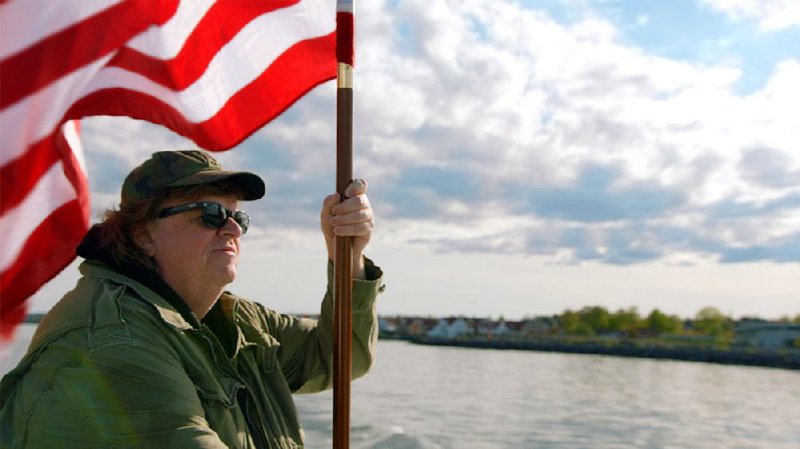The problem with Michael Moore has, from the beginning, been Michael Moore. Even when he makes good points -- and he often makes good points -- they're filtered through his carefully cultivated schlubby-truthteller-in-a-baseball-cap persona. What irritates some people about Moore's films is how self-aggrandizing they are.
This is a shame, because it's the people who wouldn't go to a Michael Moore film if you bribed them who could most benefit from sitting down and watching one. And if any of you Michael Moore haters out there would like to try that as a social experiment, might I suggest Moore's latest film, Where to Invade Next, as an excellent entry point.
Where to Invade Next
86 Cast: Documentary with Michael Moore
Director: Michael Moore
Rating: R, for language, some violent images, drug use and brief graphic nudity
Running time: 119 minutes
But first you'll have to get past the provocative title. I know it sounds like you're in for a leftist critique of American foreign policy, another jeremiad against the perpetual war that drives the military-industrial complex. Actually, it's sort of a joke -- or at least the setup for one. In a meta twist that's ripe for deconstruction by filmmaker, critic and theorist Robert Greene, Moore tells us in the film's first minutes that he was called to Washington to advise the Joint Chiefs of Staff. (Right.)
Moore says the generals were at a loss because every American military venture since World War II had been a failure, so he volunteered to single-handedly "invade countries populated by Caucasians whose names I can mostly pronounce, take the things we need from them, and bring them back home to the United States of America."
So Moore is off on a European vacation, bandying his American flag, looking to gently undermine the myth of American exceptionalism by cherry-picking the most delicious aspects of the European experience. Moore starts his "invasion" in Italy and wraps up in Iceland, presenting us with the greatest hits of these societies. In Italy, where everyone "always looks like they just had sex," Moore discovers that regular working people have about eight weeks' vacation and that all mothers receive five months' paid leave. And the CEO of the Ducati motorcycle firm thinks these policies are good for productivity -- happier workers do better work.
While an Italian union official points out that these benefits are hard-won and must be vigorously defended, in general the picture emerges of an industrial environment defined by mutual respect and co-operation. Moore dramatically plants his American flag on the factory floor and claims it for the good ol' USA.
He then proceeds to France, where elementary school students are repulsed by photographs of American school lunches (their lunches look like haute cuisine, though the chef tells him they cost less than the processed slop served stateside). Then on to Finland to look at its remarkable schools -- the Finns reformed their schools by eliminating homework and giving students more free time, and now they consistently come in at or near the top of lists of the world's best education systems. In Slovenia, a college education is essentially free, even for foreign students. In Germany, Moore makes some solid points as he highlights the way the country has come to grips with its history of atrocity. Moore wonders if the U.S. -- "a great country ... born in genocide and built on the backs of slaves" -- might benefit from similar reflection on historical sins.
In Norway, the maximum prison sentence is 21 years, and the system is set up to facilitate rehabilitation rather than punishment. Prisoners live in cottages, wear their own clothes and make their own meals, and the country has the world's lowest murder rate. (There's a moving scene in which a man who lost his son in the 2011 attack on a summer camp by right-wing terrorist Anders Behring Brevik tells Moore he has "no right" to seek justice against the murderer.) In Portugal, drug abuse has fallen off since authorities started treating it as a health-care issue rather than a crime, and the police -- at least the ones Moore talked to -- consider concern for "human dignity" their most important mission.
In the film's final two segments -- in Tunisia (the only non-European country in the film) and Iceland -- Moore floats the notion that perhaps the world would be better off if there were fewer testosterone-fueled hotheads and more nurturing women in positions of power.
Sure, Moore prefers not to talk about the problems these countries have. He says at the beginning he means to look at what they're good at, to steal ideas that might be transplanted in American soil. And it turns out that quite a few of the European countries were borrowing these ideas from us. The difference is that they followed through while we abandoned these social experiments. There's a lot here that's worth discussing, no matter which political squad holds your loyalty.
And there's also a lot of Michael Moore, which a lot of people are going to count as a liability. But he's an effective storyteller and not a bad comedian. In many ways, this is his most optimistic and gentle film.
MovieStyle on 02/12/2016
